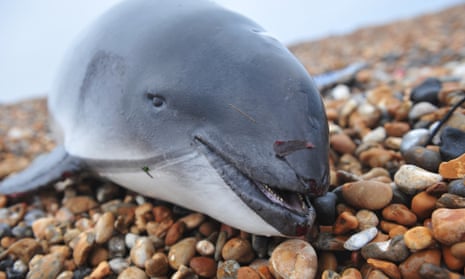More than 1,000 harbour porpoises are needlessly dying in UK waters each year, according to a report from a global environmental organisation.
The study by the World Wide Fund for Nature (WWF) says the small porpoises are accidentally trapped in fishermen’s nets, causing them to suffocate and die.
It has highlighted three hotspots – the south-west and south-east of England and the waters off Shetland, north-east of the Scottish mainland – and is calling for action to address the crisis.
WWF, which has produced the report with the Sky Ocean Rescue campaign, said gill nets (a wall of netting that traps fish by the gills) were killing the porpoises. It said other methods of fishing should be introduced and better monitoring set up.
Helen McLachlan, the charity’s fisheries programme manager, said: “The tragic deaths of harbour porpoises are a national scandal that can no longer be ignored. Many Brits will be horrified to learn of the scale of the issue and shocked that these beautiful mammals could be dying in the very nets used to catch the fish on their dinner plates. We desperately need to take action now to protect and restore nature.
“We need to see governments step up and work with the fishing industry to introduce effective mitigation or new capture methods that don’t harm porpoises or other marine wildlife. They also need to open up the secretive world of our fisheries by putting in place effective monitoring so that by-catch deaths no longer go unreported.”
The UK is home to about 177,000 harbour porpoises and has globally important areas for both feeding and breeding.
According to the report, which draws on a number of academic papers, in 2017 between 587 and 2,615 porpoises were killed, with the best estimate put at 1,098, about three a day.
The figures are partly based on data recorded by observers on board a number of boats. This figure has then been used to estimate the number of harbour porpoises accidentally caught by the whole fleet.
But the WWF says the real figure may be even higher as it does not take into account nets laid by smaller boats and the number of dead porpoises that can drop out of the net as it is hauled in.
The geographical hotspots where the number of deaths are particularly high include Cornwall, Kent, Sussex and the waters west of Shetland. The WWF says the areas are rich in marine life, which attracts both high numbers of porpoises and gill-net fisheries.
The charity said the UK was complying with obligations under EU regulations in relation to harbour porpoise by-catch in gill nets. However, it has called for alternatives to gill nets, such as hooks and hand lines for catching some species – rather than relying on methods such as “pingers”, acoustic devices designed to send a signal to divert an animal away from a net.
The WWF said effective monitoring was urgently needed, such as remote electronic monitoring, to supplement onboard checks.
